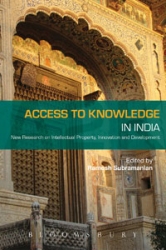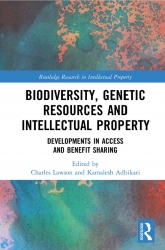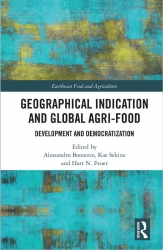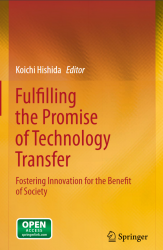
Author : Nagla Rizk
Publishing Date : Apr 29, 2014
This book is an important contribution to recovering a nuanced, contextually aware view of access to knowledge and global knowledge governance Yochaie Benkler, Harvard Law School
This is a 'must read' for scholars and practioners interested in economic devlopment, cultural production and access to knowledge Susan Sell, George Washington University
This volume features five chapters on current issues facing intellectual property, innovation and development policy from the Egyptian perspective. These include: information and communications technology for development, copyright and comparative business models in music, free and open source software, patent reform and access to medicines, and the role of the Egyptian government in promoting access to knowledge internationally and domestically.
Together these chapters offer an overview of the challenges and opportunities facing efforts to promote access to knowledge. Combining both theoretical and pragmatic approaches, the work will be of interest to scholars and practitioners dealing with intellectual property and innovation property the world over.

Author : Ramesh Subramanian, Lea Shaver
Publishing Date : Apr 29, 2014
This is the third volume in our Access to Knowledge series. India is a $1 trillion economy which nevertheless struggles with a very high poverty rate and very low access to knowledge for almost seventy percent of its population which lives in rural areas.
This volume features four parts on current issues facing intellectual property, development policy (especially rural development policy) and associated innovation, from the Indian perspective. Each chapter is authored by scholars taking an interdisciplinary approach and affiliated to Indian or American universities and Indian think-tanks. Each examines a policy area that significantly impacts access to knowledge. These include information and communications technology for development; the Indian digital divide; networking rural areas; copyright and comparative business models in music; free and open source software; patent reform and access to medicines; the role of the Indian government in promoting access to knowledge internationally and domestically.

Author : Correa, Carlos M., Hilty, Reto M.
Publishing Date : Mar 20, 2023
This open access book is the outcome of a Global Forum on Innovation, Intellectual Property and Access to Medicines held in December 2019 at the Max Plank Instititute in Munich, organised by the South Centre and the Max Plank Institute. The academics and experts from international organisations participating have contributed chapters to this book. The book is for policy makers (in Ministries of Health, Ministries of Trade, Ministries of Foreign Affairs, patent offices), but also relevant for academics (law, trade, public health), on the flexibilities available in the Agreement on Trade Related Aspects of Intellectual Property Rights (TRIPS) of the World Trade Organization to promote access to medicines.

- Biodiversity, Genetic Resources and Intellectual Property Developments in Access and Benefit Sharing
Author : Kamalesh Adhikari, Charles Lawson
Publishing Date : May 04, 2020
Debates about Access and Benefit Sharing (ABS) have moved on in recent years. An initial focus on the legal obligations established by international agreements like the United Nations Convention on Biological Diversity and the form of obligations for collecting physical biological materials have now moved to a far more complex series of disputes and challenges about the ways ABS should be implemented and enforced: repatriation of resources, technology transfer, traditional knowledge and cultural expressions; open access to information and knowledge, naming conventions, farmers’ rights, new schemes for accessing pandemic viruses and sharing DNA sequences, and so on. Unfortunately, most of this debate is now crystallised into apparently intractable discussions such as implementing the certificates of origin, recognising traditional knowledge and traditional cultural expression as a form of intellectual property, and sovereignty for Indigenous peoples. Not everything in this new marketplace of ABS has been created de novo. Like most new entrants, ABS has disrupted existing legal and governance arrangements. This collection of chapters examines what is new, what has been changed, and what might be changed in response to the growing acceptance and prevalence of ABS of genetic resources.
Biodiversity, Genetic Resources and Intellectual Property: Developments in Access and Benefit Sharing of Genetic Resources addresses current issues arising from recent developments in the enduring and topical debates about managing genetic resources through the ABS regime. The book explores key historical, doctrinal, and theoretical issues in the field, at the same time developing new ideas and perspectives around ABS. It shows the latest state of knowledge and will be of interest to researchers, academics, policymakers, and students in the fields of intellectual property, governance, biodiversity and conservation, sustainable development, and agriculture.

Author : Iain Brassington
Publishing Date : Apr 30, 2014
Education in West Central Asia is a comprehensive critical reference guide to education in the region. With chapters written by an international team of leading regional education experts, the book explores the education systems of each country in the region. With chapters covering Iran, Pakistan, Afghanistan, Kazakhstan, Kyrgyzstan, Tajikistan, Turkmenistan and Uzbekistan, the book critically examines the development of education provision in each country as well as local and global contexts. Including a comparative introduction to the issues facing education in the region as a whole and guides to available online datasets, this handbook will be an essential reference for researchers, scholars, international agencies and policy-makers at all levels.

Author : Maureen O'Sullivan
Publishing Date : Jun 19, 2019
This book critiques the decision-making process in Article 53(a) of the European Patent Convention. To date, such decisions have been taken at high levels of expertise without much public involvement. The book eschews traditional solutions, such as those found within legislative, judicial and patent office realms and instead develops a radical blueprint for how these decisions can be put to the public. By examining wide-scale models of participatory democracy and deliberation, this book fills a significant gap in the literature. It will be invaluable for patent lawyers, academics, practitioners and intellectual property and patent officials.

Author : Bryan Mercurio, Daria Kim
Publishing Date : Feb 17, 2017
This collection reflects on contemporary and contentious issues in international rulemaking in regards to pharmaceutical patent law. With chapters from both well-established and rising scholars, the collection contributes to the understanding of the regulatory framework governing pharmaceutical patents as an integrated discipline through the assessment of relevant laws, trends and policy options. Focusing on patent law and related pharmaceutical regulations, the collection addresses the pressing issues governments face in an attempt to resolve policy dilemmas involving competing interests, needs and objectives. The common theme running throughout the collection is the need for policy and law makers to think and act in a systemic manner and to be more reflective and responsive in finding new solutions within and outside the patent system to the long-standing problems as well as emerging challenges

Author : Fabrizio Ceschin, İdil Gaziulusoy
Publishing Date : Aug 21, 2019
This book discusses the most significant ways in which design has been applied to sustainability challenges using an evolutionary perspective. It puts forward an innovation framework that is capable of coherently integrating multiple design for sustainability (DfS) approaches developed so far.
It is now widely understood that design can and must play a crucial role in the societal transformations towards sustainability. Design can in fact act as a catalyst to trigger and support innovation, and can help to shape the world at different levels: from materials to products, product–service systems, social organisations and socio-technical systems. This book offers a unique perspective on how DfS has evolved in the past decades across these innovation levels, and provides insights on its promising and necessary future development directions.
For design scholars, this book will trigger and feed the academic debate on the evolution of DfS and its next research frontiers. For design educators, the book can be used as a supporting tool to design courses and programmes on DfS. For bachelor’s and master’s level design, engineering and management students, the book can be a general resource to provide an understanding of the historical evolution of DfS. For design practitioners and businesses, the book offers a rich set of practical examples, design methods and tools to apply the various DfS approaches in practice, and an innovation framework which can be used as a tool to support change in organisations that aim to integrate DfS in their strategy and processes.
The Open Access version of this book, available at https://www.taylorfrancis.com/books/9780429456510, has been made available under a Creative Commons Attribution-Non Commercial-No Derivatives 4.0 license.

Author : Alessandro Bonanno, Kae Sekine, Hart N. Feuer
Publishing Date : Jun 25, 2019
This book addresses the relevance of geographical indication (GI) as a tool for local and socio-economic development and democratization of agri-food, with case studies from Asia, Europe and the Americas.
A geographical indication is a sign used on products that have a specific geographical origin and possess qualities or a reputation that are due to that origin. It provides not only a way for businesses to leverage the value of their geographically unique products, but also to inform and attract consumers. A highly contested topic, GI is praised as a tool for the revitalization of agricultural communities, while also criticized for being an instrument exploited by global corporate forces to promote their interests. There are concerns that the promotion of GI may hamper the establishment of democratic forms of development. The contributing authors address this topic by offering theoretically informed investigations of GI from around the world. The book includes case studies ranging from green tea in Japan, olive oil in Turkey and dried fish in Norway, to French wine and Mexican Mezcal. It also places GI in the broader context of the evolution and trends of agri-food under neoliberal globalization.
The book will be of interest to researchers, policy makers and students in agri-food studies, sociology of food and agriculture, geography, agricultural and rural economics, environmental and intellectual property law, and social development.

Author : Donal O'Connell
Publishing Date : Apr 15, 2016
A fundamental change in the way organisations approach innovation is taking place. It is driven by the simple realisation that not all the smart people work for just one organisation. Few intellectual property books concentrate on external innovation and more particularly on dealing with external inventors and handling their inventions. Harvesting External Innovation begins by examining the broad subject of innovation, stressing the need to understand its forms and phases, ways and means to encourage innovation. It then addresses the growing phenomenon of external innovation. A number of different approaches to engaging with the external innovator community are then considered, together with real life case studies. Harvesting External Innovation discusses in depth how best to handle intellectual property matters, how to actually work with these external inventors and how to handle their inventions, including a suggested process and check list.
123NextLast


